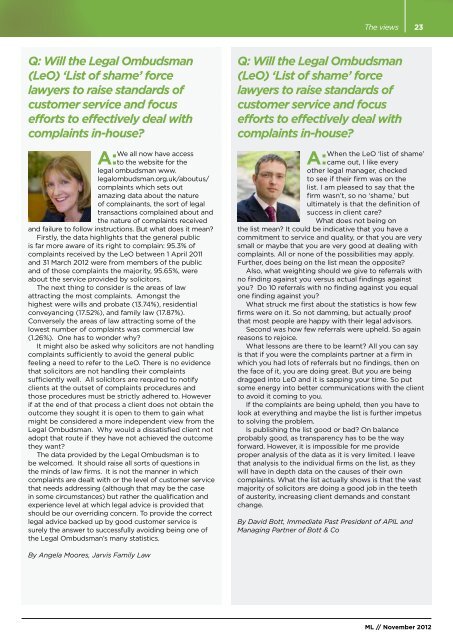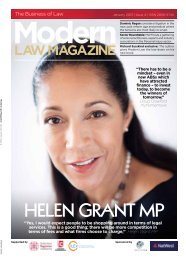Michael Napier
Michael Napier - Modern Law Magazine
Michael Napier - Modern Law Magazine
Create successful ePaper yourself
Turn your PDF publications into a flip-book with our unique Google optimized e-Paper software.
The views23Q: Will the Legal Ombudsman(LeO) ‘List of shame’ forcelawyers to raise standards ofcustomer service and focusefforts to effectively deal withcomplaints in-house?We all now have accessA: to the website for thelegal ombudsman www.legalombudsman.org.uk/aboutus/complaints which sets outamazing data about the natureof complainants, the sort of legaltransactions complained about andthe nature of complaints receivedand failure to follow instructions. But what does it mean?Firstly, the data highlights that the general publicis far more aware of its right to complain: 95.3% ofcomplaints received by the LeO between 1 April 2011and 31 March 2012 were from members of the publicand of those complaints the majority, 95.65%, wereabout the service provided by solicitors.The next thing to consider is the areas of lawattracting the most complaints. Amongst thehighest were wills and probate (13.74%), residentialconveyancing (17.52%), and family law (17.87%).Conversely the areas of law attracting some of thelowest number of complaints was commercial law(1.26%). One has to wonder why?It might also be asked why solicitors are not handlingcomplaints sufficiently to avoid the general publicfeeling a need to refer to the LeO. There is no evidencethat solicitors are not handling their complaintssufficiently well. All solicitors are required to notifyclients at the outset of complaints procedures andthose procedures must be strictly adhered to. Howeverif at the end of that process a client does not obtain theoutcome they sought it is open to them to gain whatmight be considered a more independent view from theLegal Ombudsman. Why would a dissatisfied client notadopt that route if they have not achieved the outcomethey want?The data provided by the Legal Ombudsman is tobe welcomed. It should raise all sorts of questions inthe minds of law firms. It is not the manner in whichcomplaints are dealt with or the level of customer servicethat needs addressing (although that may be the casein some circumstances) but rather the qualification andexperience level at which legal advice is provided thatshould be our overriding concern. To provide the correctlegal advice backed up by good customer service issurely the answer to successfully avoiding being one ofthe Legal Ombudsman’s many statistics.Q: Will the Legal Ombudsman(LeO) ‘List of shame’ forcelawyers to raise standards ofcustomer service and focusefforts to effectively deal withcomplaints in-house?When the LeO ‘list of shame’A: came out, I like everyother legal manager, checkedto see if their firm was on thelist. I am pleased to say that thefirm wasn’t, so no ‘shame,’ butultimately is that the definition ofsuccess in client care?What does not being onthe list mean? It could be indicative that you have acommitment to service and quality, or that you are verysmall or maybe that you are very good at dealing withcomplaints. All or none of the possibilities may apply.Further, does being on the list mean the opposite?Also, what weighting should we give to referrals withno finding against you versus actual findings againstyou? Do 10 referrals with no finding against you equalone finding against you?What struck me first about the statistics is how fewfirms were on it. So not damming, but actually proofthat most people are happy with their legal advisors.Second was how few referrals were upheld. So againreasons to rejoice.What lessons are there to be learnt? All you can sayis that if you were the complaints partner at a firm inwhich you had lots of referrals but no findings, then onthe face of it, you are doing great. But you are beingdragged into LeO and it is sapping your time. So putsome energy into better communications with the clientto avoid it coming to you.If the complaints are being upheld, then you have tolook at everything and maybe the list is further impetusto solving the problem.Is publishing the list good or bad? On balanceprobably good, as transparency has to be the wayforward. However, it is impossible for me provideproper analysis of the data as it is very limited. I leavethat analysis to the individual firms on the list, as theywill have in depth data on the causes of their owncomplaints. What the list actually shows is that the vastmajority of solicitors are doing a good job in the teethof austerity, increasing client demands and constantchange.By David Bott, Immediate Past President of APIL andManaging Partner of Bott & CoBy Angela Moores, Jarvis Family LawML // November 2012




